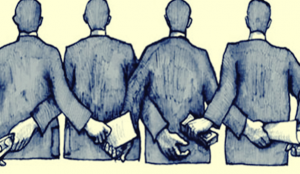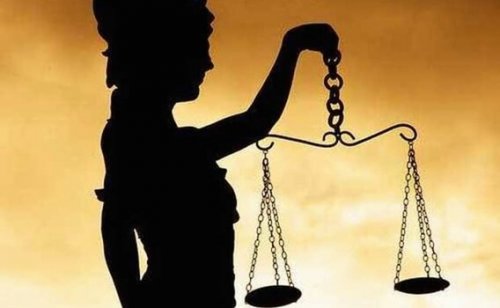Corruption Begins with Anonymous People

It’s become common for people to complain about corruption. The lack of decency we see in powerful people, especially politicians, can surprise us to no end. Every day, we see new cases of it on the news, and many of us feel that what we hear is just the tip of the iceberg.
Corruption harms societies. In essence, it’s a rupture with the pact at the heart of every civilization: the law. It’s also a malicious action, as all the other members of society become passive victims of the harm it causes. The worst part of all is that many corrupt people steal money they don’t even need. They seem to be motivated mostly by the antisocial pleasure of taking advantage of others.
“Corrupt politicians make the other ten percent look bad.”
-Henry Kissinger-
All of this is a source of indignation. However, there’s another type of corruption people don’t talk much about. That is the corruption that common citizens partake in, albeit on a much lesser scale.
Law and corruption
The law sets forth a series of commands that impose limits and obligations on everyone who is a member of a society. You can disagree with the law. That is, in fact, one of the great forces that drives history: the debate over what the law should say. New laws arise from such arguments. Sometimes, new and old laws also blend to create something different.

When you disagree with the law, there are mechanisms to challenge it. These range from civil disobedience to revolutions and political debates. No one has to obey the law blindly. However, unless the personal consequences are extremely severe, the best option is to obey the law while they’re still in effect.
Corruption springs when there’s a system of obligations that runs parallel and separately from what the law states. This system, as opposed to the legal one, is directed toward an individual’s benefit. It ignores the good of society completely.
Under that system, everything that brings an individual some gain is legal. Other people aren’t equals whose rights must be respected. Instead, they become either means to an end or obstacles. As such, they don’t count. The aim of corruption is, fundamentally, to achieve individual benefit.
Citizens and corruption
One important question we might ask ourselves is whether just politicians or people of power behave according to this philosophy of seeking personal gain regardless of how it might affect other’s rights. In this regard, if you think about some daily situations, you’ll see that many people are operating under these same principles of corruption. For them, following the law for the sake of the common good instead of their own whims isn’t the best way to live.
Instead, what takes precedence in their lives is individualism. In some societies, some people take this to extremes. Laws basically become meaningless words. Instead, the new standards in society are defined by its least scrupulous members. People tend to follow the law only when someone is watching. Corruption invades lives in small actions such as cutting in line or taking advantage of someone’s friendship to enjoy some privilege.

Perhaps that’s why the great acts of corruption continue to happen. Society tolerates these actions instead of condemning them firmly because people can use them as examples for their own behavior. Or society simply sits back and becomes a passive witness to all of this. Societies simply don’t want to make things harder by trying to intervene and set limits.
Beyond the economic or political damage caused by corruption, the worst thing is the way in which this phenomenon corrodes culture. Social bonds deteriorate due to corruption. Trust is broken. The sense of authority begins to disappear.
When this happens, civilized conduct becomes optional. In practice, the strongest law is the one in effect. However, corruption turns societies into disorganized hordes moving in random directions.
It’s become common for people to complain about corruption. The lack of decency we see in powerful people, especially politicians, can surprise us to no end. Every day, we see new cases of it on the news, and many of us feel that what we hear is just the tip of the iceberg.
Corruption harms societies. In essence, it’s a rupture with the pact at the heart of every civilization: the law. It’s also a malicious action, as all the other members of society become passive victims of the harm it causes. The worst part of all is that many corrupt people steal money they don’t even need. They seem to be motivated mostly by the antisocial pleasure of taking advantage of others.
“Corrupt politicians make the other ten percent look bad.”
-Henry Kissinger-
All of this is a source of indignation. However, there’s another type of corruption people don’t talk much about. That is the corruption that common citizens partake in, albeit on a much lesser scale.
Law and corruption
The law sets forth a series of commands that impose limits and obligations on everyone who is a member of a society. You can disagree with the law. That is, in fact, one of the great forces that drives history: the debate over what the law should say. New laws arise from such arguments. Sometimes, new and old laws also blend to create something different.

When you disagree with the law, there are mechanisms to challenge it. These range from civil disobedience to revolutions and political debates. No one has to obey the law blindly. However, unless the personal consequences are extremely severe, the best option is to obey the law while they’re still in effect.
Corruption springs when there’s a system of obligations that runs parallel and separately from what the law states. This system, as opposed to the legal one, is directed toward an individual’s benefit. It ignores the good of society completely.
Under that system, everything that brings an individual some gain is legal. Other people aren’t equals whose rights must be respected. Instead, they become either means to an end or obstacles. As such, they don’t count. The aim of corruption is, fundamentally, to achieve individual benefit.
Citizens and corruption
One important question we might ask ourselves is whether just politicians or people of power behave according to this philosophy of seeking personal gain regardless of how it might affect other’s rights. In this regard, if you think about some daily situations, you’ll see that many people are operating under these same principles of corruption. For them, following the law for the sake of the common good instead of their own whims isn’t the best way to live.
Instead, what takes precedence in their lives is individualism. In some societies, some people take this to extremes. Laws basically become meaningless words. Instead, the new standards in society are defined by its least scrupulous members. People tend to follow the law only when someone is watching. Corruption invades lives in small actions such as cutting in line or taking advantage of someone’s friendship to enjoy some privilege.

Perhaps that’s why the great acts of corruption continue to happen. Society tolerates these actions instead of condemning them firmly because people can use them as examples for their own behavior. Or society simply sits back and becomes a passive witness to all of this. Societies simply don’t want to make things harder by trying to intervene and set limits.
Beyond the economic or political damage caused by corruption, the worst thing is the way in which this phenomenon corrodes culture. Social bonds deteriorate due to corruption. Trust is broken. The sense of authority begins to disappear.
When this happens, civilized conduct becomes optional. In practice, the strongest law is the one in effect. However, corruption turns societies into disorganized hordes moving in random directions.
This text is provided for informational purposes only and does not replace consultation with a professional. If in doubt, consult your specialist.







